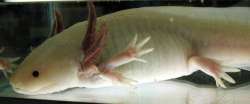Is it possible to regrow the limbs? Science has the answer
Researchers are now studying the genetics of the lower organisms, which retain the ability to regenerate form and function of almost any tissue after injury, to find out how regenerative mechanisms can be started in

Researchers are now studying the genetics of the lower organisms, which retain the ability to regenerate form and function of almost any tissue after injury, to find out how regenerative mechanisms can be started in human beings.
Scientists at the MDI Biological Laboratory have found out genetic regulators governing regeneration that are common across species using such sophisticated tools.
In a paper, scientists Benjamin L. King and Voot P. Yin identified these common genetic regulators in three regenerative species: the zebrafish, a common aquarium fish originally from India; the axolotl, a salamander native to the lakes of Mexico; and the bichir, a ray-finned fish from Africa.
The discovery of genetic mechanisms common to all three of these species, which diverged on the evolutionary tree about 420 million years ago, suggests that these mechanisms aren’t specific to individual species, but have been conserved by nature through evolution.
The discovery of the common genetic regulators is expected to serve as a platform to inform new hypotheses about the genetic mechanisms underlying limb regeneration. The discovery also represents a major advance in understanding why many tissues in humans, including limb tissue, regenerate poorly and in being able to possibly manipulate those mechanisms with drug therapies.
“Limb regeneration in humans may sound like science fiction, but it’s within the realm of possibility,” said Yin. “The fact that we’ve identified a genetic signature for limb regeneration in three different species with three different types of appendages suggests that nature has created a common genetic instruction manual governing regeneration that may be shared by all forms of animal life, including humans.”
While speedier wound-healing and improved prostheses may be on the nearer-term horizon, the ability to regrow limbs is a long way off. How long? “It depends on the pace of discovery, which is heavily dependent on funding,” Yin said.
He predicted the timeline could be hastened if enough research funding were available. “Unfortunately,” he added, “we are in a period of greatly diminished funding for scientific research.”
The study is published in the journal PLOS ONE.
(With agency input)
